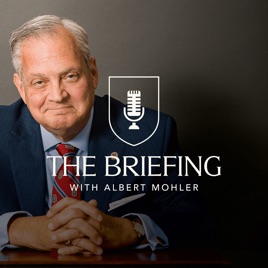
Advertise on podcast: Read The Bible
Rating
4.7 from
Country
This podcast has
37 episodes
Language
Publisher
Explicit
No
Date created
2019/12/17
Average duration
-
Release period
2 days
Description
Read the Bible features devotional commentaries from D.A. Carson’s book For the Love of God (vol. 1) that follow the M’Cheyne Bible reading plan. This podcast is designed to be used alongside TGC's Read The Bible initiative (TGC.org/readthebible).
Podcast episodes
Check latest episodes from Read The Bible podcast
Exodus 9; Luke 12; Job 27; 1 Corinthians 13
2024/02/26
You’ve seen the bumper sticker that says, “The person with the most toys wins.” Wins what? The person with the most toys takes out of this life exactly what everyone else does. A billion years or so into eternity, how many toys we accumulated during our seventy years in this life will not seem too terribly important.
Yet in a materialistic culture, it is horrifying to begin to recognize just how endemic greed is, how it seeps into all kinds of priorities and relationships. In Luke 12:13–21, Jesus is confronted by someone who begs him, “Teacher, tell my brother to divide the inheritance with me.” We do not know whether this individual had a just complaint or not. From Jesus’s perspective, it did not matter, for a more fundamental issue was at stake. For this individual, a share of the inheritance was more important than a godly relationship with his brother. Not only does Jesus insist he did not come to be an arbiter of such minor matters (12:14), he warns, “Watch out! Be on your guard against all kinds of greed; a man’s life does not consist in the abundance of his possessions” (12:15). Perhaps the person with the most toys does not win after all.
This precipitates the parable of the rich farmer whose rising stores of grain prompt him to build bigger and bigger barns (12:16–20). In our culture, we might easily substitute builder or software producer or real estate agent for farmer. In a culture that fixates on present possessions, it is distressingly easy for believers to get sucked into the same vortex of greed. What starts as an entirely proper commitment to do one’s best for Christ’s sake degenerates into a selfish competitiveness and a bottomless acquisitiveness. You busily plan your retirement; after all, you tell yourself, you have “plenty of good things laid up for many years” (12:19). Because everyone is telling you how well you are doing, you do not hear the voice of God: “You fool! This very night your life will be demanded from you. Then who will get what you have prepared for yourself?” (12:20).
The problem is not wealth itself. The Bible bears witness to some rich people who used their wealth for God, people who were not so attached to their wealth that it became a surrogate god. Yet one hesitates to point out this fact, for most of us are so good at deceiving ourselves we inevitably think this concession lets us off the hook. Others are greedy or miserly; I am hard working and frugal. Others are materialistic and hedonistic; I am realistic and believe that a merry heart does good like medicine. So meditate on Luke 12:21.
more
Exodus 8; Luke 11; Job 25–26; 1 Corinthians 12
2024/02/25
One of the most striking features of what might be called a “partial conversion” is found in Luke 11:24–26. Jesus teaches that when an evil spirit comes out of someone, it “goes through arid places seeking rest ant does not find it”—apparently looking for some new person in whom to take up residence. Then the spirit contemplates returning to its previous abode. A reconnoiter finds the former residence surprisingly vacant. The spirit rounds up seven cronies who are even more vile, “and they go in and live there. And the final condition of that man is worse than the first.”
Apparently the man who has been exorcised of the evil spirit never replaced that spirit with anything else. The Holy Spirit did not take up residence in his life; the man simply remained vacant, as it were.
There are three lessons to learn.
First, “partial conversions” are all too common. A person gets partially cleaned up. He or she is drawn close enough to the gospel and to the people of God that there is some sort of turning away from godlessness, a preliminary infatuation with holiness, an attraction toward righteousness. But like the person represented by rocky soil in the parable of the sower and the soils (8:4–15), this person may initially seem to be the best of the crop, and yet not endure. There has never been the kind of conversion that spells the takeover of an individual by the living God, a reorientation tied to genuine repentance and enduring faith.
The second lesson follows: a little gospel is a dangerous thing. It gets people to think well of themselves, to sigh with relief that the worst evils have been dissipated, to enjoy a nice sense of belonging. But if a person is not truly justified, regenerated, and transferred from the kingdom of darkness and into the kingdom of God’s dear Son, the dollop of religion may serve as little more than an inoculation against the real thing.
The third lesson is inferential. This passage is thematically tied to another large strand of Scripture. Evil cannot simply be opposed—that is, it is never enough simply to fight evil, to cast out a demon. Evil must be replaced by good, the evil spirit by the Holy Spirit. We must “overcome evil with good” (Rom. 12:21). For instance, it is difficult to overcome bitterness against someone by simply resolving to stop being bitter; one must replace bitterness by genuine forgiveness and love for that person. It is difficult to overcome greed by simply resolving not to be quite so materialistic; one must fasten one’s affections on better treasure (cf. Luke 12:13–21) and learn to be wonderfully and self-sacrificially generous. Overcome evil with good.
more
Exodus 7; Luke 10; Job 24; 1 Corinthians 11
2024/02/24
The story is told of Dr. Martyn Lloyd-Jones, one of the most influential preachers of the 20th century. When he was dying of cancer, one of his friends and former associates asked him, in effect, “How are you managing to bear up? You have been accustomed to preaching several times a week. You have begun important Christian enterprises; your influence has extended through tapes and books to Christians on five continents. And now you have been put on the shelf. You are reduced to sitting quietly, sometimes managing a little editing. I am not so much asking therefore how you are coping with the disease itself. Rather, how are you coping with the stress of being out of the swim of things?”
Lloyd-Jones responded in the words of Luke 10: “Do not rejoice that the spirits submit to you, but rejoice that your names are written in heaven” (10:20—though of course Lloyd-Jones would have cited the King James Version).
The quotation was remarkably apposite. The disciples have just returned from a trainee mission, and marvel that “even the demons submit to us in your name” (10:17). At one level, Jesus encourages them. He assures them that (in some visionary experience?) he has seen Satan fall like lightning from heaven (10:18). Apparently Jesus understands this trainee mission by his disciples as a sign, a way-stage, of Satan’s overthrow, accomplished in principle at the cross (cf. Rev. 12:9-12). He tells his disciples that they will witness yet more astonishing things than these (Luke 10:18–19). “However,” he adds (and then come the words quoted by Lloyd-Jones), “do not rejoice that the spirits submit to you, but rejoice that your names are written in heaven” (10:20).
It is so easy to rejoice in success. Our self-identity may become entangled with the fruitfulness of our ministry. Of course, that is dangerous when the success turns sour—but that is not the problem here. Things could not be going better for Jesus’s disciples. And then the danger, of course, is that it is not God who is being worshiped. Our own wonderful acceptance by God himself no longer moves us, but only our apparent success.
This has been the sin of more than a few “successful” pastors, and of no fewer “successful” lay people. While proud of their orthodoxy and while entrusted with a valid mission, they have surreptitiously turned to idolizing something different: success. Few false gods are so deceitful. When faced with such temptations, it is desperately important to rejoice for the best reasons—and there is none better than that our sins are forgiven, and that by God’s own gracious initiative our names have been written in heaven.
more
Exodus 6; Luke 9; Job 23; 1 Corinthians 10
2024/02/23
One of the tasks imposed on those who wish to read the canonical Gospels sensitively is to see how the various units are linked. Casual readers remember individual stories about Jesus from their Sunday school days, but do not always reflect on the links that weld these stories into a complete Gospel. Moreover, the individual evangelists did not arrange their material exactly the same way as the others, so the special flavor of each gospel is often lost unless the distinctive links are thoughtfully pondered.
An instructive example is found in Luke 9:49–50. The preceding verses (9:46-48) find Jesus’s disciples arguing as to which of them would be greatest (in the consummated kingdom, presumably). Knowing their thoughts, Jesus teaches them an embarrassing lesson, employing a little child to make his point. Important people honey up to even more important people. Those who follow Jesus welcome the least powerful members of society—the little children. What Jesus demands is an outlook fundamentally at variance with that of the world: “For he who is least among you all—he is the greatest” (9:48).
It is at this juncture that 9:49–50 comes into play. John comments that he and the others saw a man driving out demons in Jesus’s name, “and we tried to stop him, because he is not one of us.” Jesus forbids them this course of action, “for whoever is not against you is for you.” At first glance this is a somewhat different topic from that of the preceding verses. Then again, maybe not: the connections call for reflection. John’s complaints no longer sound like godly concern for orthodoxy, but like power-hungry moaning more concerned that those who preach and heal belong to the right party than that the mission itself be advanced. So this is pathetically tied to the debate over who would be the greatest. Personal aggrandizement will inevitably prove an unstable base for making wise assessments of the ministry of others.
The following verses (9:51–56) find Jesus in Samaria. When the Samaritans prove inhospitable, Jesus’s disciples are quite prepared to call fire down upon them. Jesus rebukes them. Since these verses follow the themes already elucidated, the attitude the disciples here betray is clarified. Their passion for judgment against the Samaritans is motivated less by a genuine grasp of and devotion to Christ Jesus, than by a power-hungry self-focus.
The closing verses of the chapter highlight the same contrast (9:57–62). The three who protest the loudest about how eagerly they will follow Jesus are firmly put in their place: they have not counted the cost of discipleship, and so their pious protestations take on the ugly hue of self-love.
more
Exodus 5; Luke 8; Job 22; 1 Corinthians 9
2024/02/22
According to Luke 8:19–21, “Jesus’s mother and brothers came to see him” but were unable to achieve their objective owing to the press of the crowd. Word was passed up to Jesus: “Your mother and brothers are standing outside, wanting to see you”—apparently under the assumption that Jesus himself would make his way to them, or use his authority to ensure that a passage was opened up for them. After all, this was a culture much less individualistic than our own, much more oriented to the family and the extended family.
That is what makes Jesus’s answer astonishing: “My mother and brothers are those who hear God’s word and put it into practice” (8:21). Four things must be said.
First, this is not an isolated passage. Once Jesus begins his public ministry, on no occasion, until the cross, does he betray any slight preference for his own family members, including his mother. In every instance, he either quietly distances himself from them (as here and 11:27–28), or else gently rebukes them (e.g., John 2:1–11). There is no exception. Those who argue that Mary has an inside track into the affections and blessings that only Jesus can bestow cannot responsibly adduce evidence from these texts.
Second, the reasons for Jesus’s conduct are not hard to find. Quite apart from this passage, the Gospels keep drawing attention to Jesus’s uniqueness. In the context of Luke, the familial connection is overshadowed by Jesus’s virginal conception, which is tied to Jesus’s mission and to who he is. Judging by the book of Acts, even Jesus’s natural family had to come to terms, after the resurrection, with who this son and brother of theirs really was, and they became part of the Christian community that worshiped him.
Third, not for a moment does this suggest Jesus was callous toward the feelings of his family. One of the most touching moments in the gospel of John pictures Jesus on the cross, almost with his dying breath providing the care and stability needed to his distraught mother (John 19:26–27).
Fourth, the force of the passage before us must not be missed: Jesus insists that those closest to him, those he “owns” as his, those who have ready access to him, those who are part of his real family, are henceforth not his natural relatives, but “those who hear God’s word and put it into practice” (8:21). Unlike many rulers, Jesus showed no interest in a natural dynasty. Nor was his ultimate focus on his tribe, clan, or nuclear family. He came to call into permanent being the family of God—and they are characterized by the obedient hearing of God’s word.
more
Exodus 4; Luke 7; Job 21; 1 Corinthians 8
2024/02/21
In Exodus 4 two elements introduce complex developments that stretch forward to the rest of the Bible.
The first is the reason God gives as to why Pharaoh will not be impressed by the miracles that Moses performs. God declares, “I will harden his heart so that he will not let the people go” (4:21). During the succeeding chapters, the form of expression varies: not only “I will harden Pharaoh’s heart” (7:3), but also “Pharaoh’s heart became hard” or “was hard” (7:13, 22; 8:19, etc.) and “he hardened his heart” (8:15, 32, etc). No simple pattern is discernible in these references. On the one hand, we cannot say that the pattern works up from “Pharaoh hardened his heart” to “Pharaoh’s heart was hardened” to “God hardened Pharaoh’s heart” (as if God’s hardening were nothing more than the divine judicial confirmation of a pattern the man had chosen for himself); on the other hand, we cannot say that the pattern simply works down from “God hardened Pharaoh’s heart” to “Pharaoh’s heart was hardened” to “Pharaoh hardened his heart” (as if Pharaoh’s self-imposed hardening was nothing more than the inevitable out-working of the divine decree).
Three observations may shed some light on these texts. (a) Granted the Bible’s storyline so far, the assumption is that Pharaoh is already a wicked person. In particular, he has enslaved the covenant people of God. God has not hardened a morally neutral man; he has pronounced judgment on a wicked man. Hell itself is a place where repentance is no longer possible. God’s hardening has the effect of imposing that sentence a little earlier than usual. (b) In all human actions, God is never completely passive: this is a theistic universe, such that “God hardens Pharaoh’s heart” and “Pharaoh hardened his own heart,” far from being disjunctive statements, are mutually complementary. (c) This is not the only passage where this sort of thing is said. See, for instance, 1 Kings 22; Ezekiel 14:9; and above all 2 Thessalonians 2:11–12: “For this reason God sends them a powerful delusion so that they will believe the lie and so that all will be condemned who have not believed the truth but have delighted in wickedness.”
The second forward-looking element is the “son” terminology: “Israel is my firstborn son, and I told you, ‘Let my son go, so he may worship me.’ But you refused to let him go; so I will kill your firstborn son” (Ex. 4:22–23). This first reference to Israel as the son of God develops into a pulsating typology that embraces the Davidic king as the son par excellence, and results in Jesus, the ultimate Son of God, the true Israel and the messianic King.
more
Exodus 3; Luke 6; Job 20; 1 Corinthians 7
2024/02/20
Two elements in Exodus 3 demand attention.
The first is the dramatic introduction of “the angel of the LORD” (3:2). Initially, at least, Moses does not perceive an “angel.” The text reads, “There the angel of the LORD appeared to him in flames of fire from within a bush”—but this cannot mean that an angelic being appeared within the flames, differentiable from the flames, for what draws Moses’s attention is the bush itself which, though apparently burning, was never consumed. The manifestation of “the angel of the LORD,” then, was apparently in the miraculous flames themselves. Strikingly, when the voice speaks to Moses out of the burning bush, it is not the voice of the angel but the voice of God: “God called to him from within the bush, ‘Moses! Moses!’” (3:4). The ensuing discussion is between God and Moses; there is no further mention of “the angel of the LORD.”
On the face of it, then, this “angel of the LORD” is some manifestation of God himself. We shall have occasion to think through other Old Testament passages where the angel of the Lord appears—sometimes in human form, sometimes not even explicitly called an “angel” (recall the “man” who wrestles with Jacob in Gen. 32), always hauntingly “other,” and always identified in some way with God himself.
We might well ask if, when the text before us records that “God said,” it really means no more than that God spoke through this angelic messenger: after all, if the messenger speaks the words of God, then in a sense it is God himself who is speaking. But the biblical manifestations of “the angel of the LORD” do not easily fit into so neat and simplistic an explanation. It is almost as if the biblical writers want to stipulate that God himself appeared, while distancing this transcendent God from any mere appearance. The angel of the Lord remains an enigmatic figure who is identified with God, yet separable from him—an early announcement, as it were, of the eternal Word who became flesh, simultaneously God’s own fellow and God’s own self (John 1:1, 14).
The second element is even more important, though I can assign it only the briefest comment here. The name of God (3:13–14) may be rendered “I AM WHO I AM,” as it is in the NIV, or “I will be what I will be.” In Hebrew, the abbreviated form “I am” is related in some fashion to YHWH, often spelled out as Yahweh (and commonly rendered “LORD,” in capital letters; the same Hebrew letters stand behind English Jehovah). The least that this name suggests is that God is self-existent, eternal, completely independent, and utterly sovereign: God is what he is, dependent on no one and nothing.
more
Exodus 2; Luke 5; Job 19; 1 Corinthians 6
2024/02/19
In the most crucial events in redemptive history, God takes considerable pains to ensure that no one can properly conclude that these events have been brought about by human resolve or wit. They have been brought about by God himself—on his timing, according to his plan, by his means, for his glory—yet in interaction with his people. All of this falls out of Exodus 2:11–25.
The account is brief. It does not tell us how Moses’s mother managed to instill in him a profound sense of identity with his own people before he was brought up in the royal household. Perhaps he enjoyed ongoing contact with his birth mother; perhaps as a young man he delved into his past, and thoroughly investigated the status and subjugation of his own people. We are introduced to Moses when he has already so identified with the enslaved Israelites that he is prepared to murder a brutal Egyptian slave overlord. When he discovers that the murder he committed has become public knowledge, he must flee for his life.
Yet one cannot help reflecting on the place of this episode in the plotline that leads to Moses’s leadership of the Exodus some decades later. By God’s own judicial action, many Egyptians would then die. So why doesn’t God use Moses now, while he is still a young man, full of zeal and eagerness to serve and emancipate his people?
It simply isn’t God’s way. God wants Moses to learn meekness and humility, to rely on God’s powerful and spectacular intervention, to await God’s timing. He acts in such a way that no one will be able to say that the real hero is Moses, the great visionary. By the time he is eighty, Moses does not want to serve in this way, he is no longer an idealistic, fiery visionary. He is an old man whom God almost cajoles (Ex. 3) and even threatens (Ex. 4:14) into obedience. There is therefore no hero but God, and no glory for anyone other than God.
The chapter ends by recording that “the Israelites groaned in their slavery and cried out, and their cry for help because of their slavery went up to God. God heard their groaning and he remembered his covenant with Abraham” (2:23–24). This does not mean that God had forgotten his covenant. We have already seen that God explicitly told Jacob to descend into Egypt and foretold that God would one day bring out the covenantal plan. The same God who sovereignly arranges these matters and solemnly predicts what he will do, chooses to bring about the fulfillment of these promises by personally interacting with his covenantal people in their distress, responding to their cry.
more
Exodus 1; Luke 4; Job 18; 1 Corinthians 5
2024/02/18
“Then a new king, who did not know about Joseph, came to power in Egypt” (Ex. 1:8). Those who learn nothing from history are destined to repeat all its mistakes, we are told; or, alternatively, the only thing that history teaches is that nothing is learned from history. Whimsical aphorisms aside, one cannot long read Scripture without pondering the sad role played by forgetting.
Examples abound. One might have expected, after the flood, that so sweeping a judgment would frighten postdiluvian human beings into avoiding the wrath of God, but that is not what happens. God leads Israel out of bondage, deploying spectacular plagues and the crossing of the Red Sea, but mere weeks elapse before the Israelites are prepared to ascribe their rescue to a god represented by a golden calf. The book of Judges describes the wretched pattern of sin, judgment, rescue, righteousness, followed by sin, judgment, rescue, righteousness—the wearisome cycle spiraling downward. One might have thought that under the Davidic dynasty, kings in the royal line would remember the lessons their fathers learned, and be careful to seek the blessing of God by faithful obedience; but that is scarcely what occurred. After the catastrophic destruction of the northern kingdom and the removal of its leaders and artisans to exile under the Assyrians, why did not the southern kingdom take note and preserve covenantal fidelity? In fact, a bare century-and-a-half later the Babylonians subject them to a similar fate. Appalling forgetfulness is not hard to find in some of the New Testament churches as well.
So the forgetfulness of Egypt’s rulers, aided by a change of dynasty, is scarcely surprising. A few hundred years is a long time. How many Christians in the West have really absorbed the lessons of the evangelical awakening, let alone of the magisterial Reformation?
Not far from where I am writing these lines is a church that draws five or six thousand on a Sunday morning. Its leaders have forgotten that it began as a church plant a mere two decades ago. They now want to withdraw from the denomination that founded them, not because they disagree theologically with that denomination, not because of some moral flaw in it, but simply because they are so impressed by their own bigness and importance that they are too arrogant to be grateful. One thinks of seminaries that have abandoned their doctrinal roots within one generation, of individuals, not the least scholars, who are so impressed by novelty that clever originality ranks more highly with them than godly fidelity. Nations, churches, and individuals change, at each step thinking themselves more “advanced” than all who went before.
To our shame, we forget all the things we should remember.
more
Genesis 50; Luke 3; Job 16 – 17; 1 Corinthians 4
2024/02/17
The last chapter of Genesis includes a section that is both pathetic and glorious (Gen. 50:15–21).
Everything that is sad and flawed in this family resurfaces when Jacob dies. Joseph’s brothers fear that their illustrious sibling may have suppressed vengeful resentment only until the death of the old man. Why did they think like this? Was it because they were still lashed with guilt feelings? Were they merely projecting onto Joseph what they would have done had they been in his place?
Their strategy involves them in fresh sin: they lie about what their father said, in the hope that an appeal from Jacob would at least tug at Joseph’s heartstrings. In this light, their abject submission (“We are your slaves,” 50:18) sounds less like loyal homage than desperate manipulation.
By contrast, Joseph weeps (50:17). He cannot help but see that these groveling lies betray how little he is loved or trusted, even after seventeen years (47:28) of nominal reconciliation. His verbal response displays not only pastoral gentleness—“he reassured them and spoke kindly to them,” promising to provide for them and their families (50:21)—it also reflects a man who has thought deeply about the mysteries of providence, about God’s sovereignty and human responsibility. “Don’t be afraid,” he tells them. “Am I in the place of God? You intended to harm me, but God intended it for good to accomplish what is now being done, the saving of many lives” (50:19–20).
The profundity of this reasoning comes into focus as we reflect on what Joseph does not say. He does not say that during a momentary lapse on God’s part, Joseph’s brothers sold him into slavery, but that God, being a superb chess player, turned the game around and in due course made Joseph prime minister of Egypt. Still less does he say that God’s intention had been to send Joseph down to Egypt in a well-appointed chariot, but unfortunately Joseph’s brothers rather mucked up the divine plan, forcing God to respond with clever countermoves to bring about his own good purposes. Rather, in the one event—the selling of Joseph into slavery—there were two parties, and two quite different intentions. On the one hand, Joseph’s brothers acted, and their intentions were evil; on the other, God acted, and his intentions were good. Both acted to bring about this event, but while the evil in it must be traced back to the brothers and no farther, the good in it must be traced to God.
This is a common stance in Scripture. It generates many complex philosophical discussions. But the basic notion is simple. God is sovereign, and invariably good; we are morally responsible, and frequently evil.
more
Genesis 49; Luke 2; Job 15; 1 Corinthians 3
2024/02/16
Jesus grew up a thoroughly Jewish boy. Not only was his lineage Jewish, it was Davidic: legally, he belonged to the suppressed royal house (Luke 2:4). Imperial politics were divinely manipulated to ensure that Jesus would be born in the ancient town of David (2:1–4, 11). On the eighth day of his life, he was circumcised (2:21). At the appropriate time, Mary and Joseph offered a sacrifice in keeping with the Law’s prescription of what was required of every firstborn male (2:22–24). “Joseph and Mary,” we are told, did “everything required by the Law of the Lord” (2:39). In the first days of Jesus’s life, Simeon prophetically addressed God in prayer, declaring that the coming of Jesus was “for glory to your people Israel” (2:32); aged Anna “gave thanks to God and spoke about the child to all who were looking forward to the redemption of Jerusalem” (2:38). Every year, Joseph and Mary traveled the long miles from Nazareth to Jerusalem to participate in the Feast of Passover, “according to the custom” (2:41–42), joining tens of thousands of other pilgrims; and of course, Jesus went along, witnessed the slaughter of thousands of Passover lambs, heard the temple choirs, and recited the ancient Scriptures. At the age of twelve, Jesus’s constant exposure to the heritage of his people and the content of their Scriptures led to the extraordinary exchanges he enjoyed with the temple teachers (2:41–52).
We cannot begin to grasp the categories in which Jesus spoke and acted, the categories in which his life and ministry, his death and resurrection, have significance, unless we find them in the ancient Hebrew Bible.
Yet that is not all there is to say. That same Bible does not begin with Abraham and the origins of the Israelites. It begins with God, the origin of the universe, the creation of human beings bearing God’s image, the wretched rebellion of the fall, the first cycles of judgment and forgiveness, the first promises of redemption to come. Certainly Paul understood that the Bible’s long story of the Jews must be set within the still longer story of the human race, and that even the first calling of the man who is the ancestor of all Jews specifies that through him all the nations of the earth will be blessed (Gal. 3; cf. Gen. 12). Here at the beginning of Jesus’s life, the same framework peeps through. Simeon praises the Sovereign Lord for allowing him to live to see this baby: “For my eyes have seen your salvation, which you have prepared in the sight of all people, a light for revelation to the Gentiles and for glory to your people Israel” (2:31–32).
more
Genesis 48; Luke 1:39-80; Job 14; 1 Corinthians 2
2024/02/15
Sometimes bad theology breeds reactionary bad theology. Because Roman Catholicism has gradually added more titles and myths to Mary, Protestants have sometimes reacted by remaining silent about her astonishing character. Neither approach fares very well when tested by this passage (Luke 1:39–80) and a few others we shall have occasion to think about.
Catholics have added titles such as “Mother of God” and “Queen of Heaven” to Mary, neither of which is found in the Bible. The view that Mary was immaculately conceived (and was therefore born sinless), and that she, like Enoch, was transported to heaven bodily, thereby escaping death, are equally unsupported. The latter became a dogma for Roman Catholics as recently as 1950. According to news reports, the current Pope is weighing whether he should establish, as something that must be confessed, another title conservative Catholics apply to Mary, viz. “Co-Redemptrix.”
But Luke’s witness points in another direction. In Mary’s song (1:46-55), traditionally called the Magnificat (from the Latin word for magnifies: “My soul magnifies [NIV—glorifies] the Lord”), Jesus’s mother says that her spirit rejoices in “God my Savior”—which certainly sounds as if she thought of herself as needing a Savior, which would be odd for one immaculately conceived. Indeed, a rapid scan of the Gospels discloses that during Jesus’s ministry, Mary had no special access to her famous son, sometimes failed to understand the nature of his mission (e.g., 2:48–50), and never helped someone obtain some favor from Jesus that he or she could not otherwise obtain. Indeed, the unanimous testimony of Scripture is that people should come to Jesus: “Come to me, all you who are weary and burdened, and I will give you rest” (Matt. 11:28), Jesus says—not, “Come to my mother.” He alone is the true mediator between God and human beings.
Nevertheless, Mary is wholly admirable, a model of many virtues (as is also, e.g., Joseph in Gen. 37–50). She accepts her astonishing role with submissiveness and equanimity, considering what it must have initially done to her reputation (1:34–38). Elizabeth twice calls her “blessed” (1:42, 45), i.e., approved by God; the supernatural recognition of the superiority of Mary’s Son over Elizabeth’s son (1:41–45) was doubtless one of the things that Mary pondered in her heart (2:19). But none of this goes to Mary’s head: she herself recognizes that her “blessedness” is not based on intrinsic superiority, but on God’s (the “Mighty One’s”) mindfulness of her “humble state” and his choice to do “great things” for her (1:48–49). Her focus in the Magnificat, as ours must be, is on the faithfulness of God in bringing about the deliverance so long promised (1:50–55).
more
Podcast reviews
Read Read The Bible podcast reviews
BrycimusMaximus
2020/02/03
Superb
I’ve been the book format for a few years... What a blessing to have it available on audio! The narration is excellent. I will be using this every day...
more
KGB-Smeagol
2020/01/03
Good devotional guide!
I’ve used this devotional in years past, but it’s a blessing to have it in audio form now delivered daily as a podcast.
Llamacop
2020/01/02
Please release a little earlier
This is a great idea. But I agree with a previous comment. I am listening from Kenya in the morning, and so an earlier release would be nice.
Ellieheardthat
2020/01/02
A couple improvements needed
Is it possible to release them earlier so that if we want to read ahead we can? I started the plan before the 1st, so I’m ahead. Also, is it just me, ...
more
PLMorris
2020/01/01
Consider a change to release times?
Helpful podcast and great idea but for those of us reading in the morning not from the US (eg, Australia) earlier release times would help.
Podcast sponsorship advertising
Start advertising on Read The Bible & sponsor relevant audience podcasts
You may also like these christianity Podcasts

4.9
22410
843
Unashamed with the Robertson Family
Blaze Podcast Network

4.8
7453
79
The Briefing - AlbertMohler.com
R. Albert Mohler, Jr.

4.8
13347
107
Timothy Keller Sermons Podcast by Gospel in Life
Tim Keller

4.8
14580
326
Elevation with Steven Furtick
iHeartPodcasts

4.9
5856
389
Made For This with Jennie Allen
Made For This with Jennie Allen

4.7
1029
14
Podcast Pray as you go
Pray as you go

4.9
1057
120
John Mark Comer Teachings
Practicing the Way

4.8
5950
137
Pastor Rick's Daily Hope
PastorRick.com

4.5
1219
28
Sekulow
Jay Sekulow

4.9
6557
452
The Fr. Mike Schmitz Catholic Podcast
Ascension



